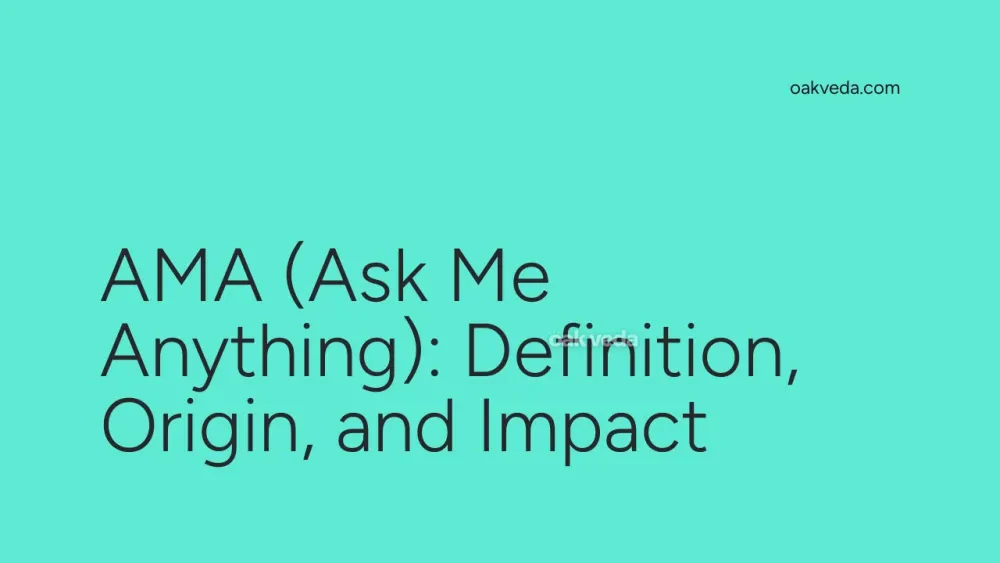
What is AMA?
AMA, which stands for "Ask Me Anything," is a popular interactive format used across various social media platforms and online communities. It's a Q&A session where an individual, typically someone with expertise, unique experiences, or celebrity status, invites an audience to ask them questions on any topic. The host then answers these questions, creating an engaging and often enlightening dialogue.
Origin and Development of AMA
The concept of AMA gained significant traction on Reddit, one of the world's largest online communities, in the late 2000s. The subreddit r/IAmA (I Am A) was created in 2009, which formalized the AMA format. However, the idea quickly spread to other platforms, including Twitter, Facebook, Instagram, and even professional networks like LinkedIn.
As social media evolved, so did the AMA format. What started as text-based interactions on Reddit has now expanded to include live video sessions, Instagram Stories, and Twitter Spaces, making AMAs more dynamic and accessible across different platforms.
How AMA Works
The process of conducting an AMA typically involves the following steps:
- Announcement: The host announces the AMA, specifying the date, time, and platform.
- Question Collection: Audience members submit their questions, often using a specific hashtag or in a designated thread.
- Selection: The host or their team selects questions to answer.
- Response: The host provides answers, either in real-time or over a set period.
- Interaction: Followers can engage with the answers, often leading to follow-up questions or discussions.
Types of AMAs
AMAs can take various forms depending on the platform and the host's preferences:
- Text-based AMAs: Common on Reddit and Twitter, where questions and answers are primarily in written form.
- Video AMAs: Platforms like Instagram Live and YouTube allow for real-time video interactions.
- Audio AMAs: Emerging formats like Twitter Spaces and Clubhouse enable audio-only AMA sessions.
- Themed AMAs: Some hosts focus on specific topics, such as career advice, industry insights, or personal experiences.
Popular Examples of AMAs
Many notable figures have participated in AMAs, contributing to the format's popularity:
- Barack Obama's Reddit AMA in 2012, which temporarily crashed the site due to overwhelming traffic.
- Bill Gates' regular Reddit AMAs, where he discusses technology, philanthropy, and global issues.
- Elon Musk's Twitter AMAs, often focusing on his various business ventures and futuristic ideas.
- Celebrity AMAs on Instagram Live, providing fans with direct access to their favorite stars.
Impact of AMA on Social Media Culture
AMAs have significantly influenced social media culture in several ways:
- Increased Transparency: They've created an expectation of openness and accessibility from public figures and brands.
- Community Building: AMAs foster a sense of community by allowing direct interaction between hosts and audiences.
- Knowledge Sharing: They've become a platform for sharing expertise and insider knowledge across various fields.
- Humanizing Public Figures: AMAs help to present a more relatable side of celebrities, experts, and leaders.
How Brands and Influencers Use AMA
AMAs have become a powerful tool in digital marketing and personal branding strategies:
- Product Launches: Companies use AMAs to generate buzz around new products or services.
- Crisis Management: AMAs can be an effective way to address controversies or clarify misunderstandings.
- Audience Engagement: Influencers use AMAs to strengthen connections with their followers and gain insights into their interests.
- Thought Leadership: Industry experts conduct AMAs to establish themselves as authoritative voices in their fields.
Future Trends Related to AMA
As social media continues to evolve, we can expect several trends in the AMA space:
- AI-Assisted AMAs: Artificial intelligence might help hosts manage and respond to a larger volume of questions.
- Virtual Reality AMAs: As VR technology advances, we might see more immersive AMA experiences.
- Niche Platform AMAs: Specialized platforms catering to specific industries or interests may develop their own AMA formats.
- Monetization: Some platforms may introduce ways for hosts to monetize their AMA sessions directly.
FAQs about AMA
-
How long does a typical AMA last? The duration can vary widely, from an hour to several days, depending on the host and platform.
-
Are AMAs always live? Not necessarily. While many are conducted in real-time, some hosts prefer to collect questions in advance and answer them over an extended period.
-
How can I participate in an AMA? Follow your favorite personalities or brands on social media platforms, and watch for AMA announcements. When one is scheduled, prepare your questions and submit them according to the specified guidelines.
-
Can anyone host an AMA? While anyone can technically host an AMA, they are most effective when the host has a significant following or unique insights to share.
-
How do hosts manage inappropriate questions during AMAs? Most platforms allow hosts or moderators to filter or ignore inappropriate questions. Many hosts also set ground rules at the beginning of the session.
In conclusion, AMAs have revolutionized the way we interact on social media, breaking down barriers between public figures and their audiences. As this format continues to evolve, it promises to remain a vital tool for engagement, marketing, and knowledge sharing in the digital age.
You may be interested in:
- Customer Reviews: Definition, Origin, and Impact
- Cap: Definition, Origin, and Impact on Social Media
- Highkey: Definition, Origin, and Impact on Social Media
- Flop Era: Definition, Origin, and Impact on Social Media
- Flex: Definition, Origin, and Impact on Social Media
- Share of Voice (SOV): Definition, Origin, and Impact

